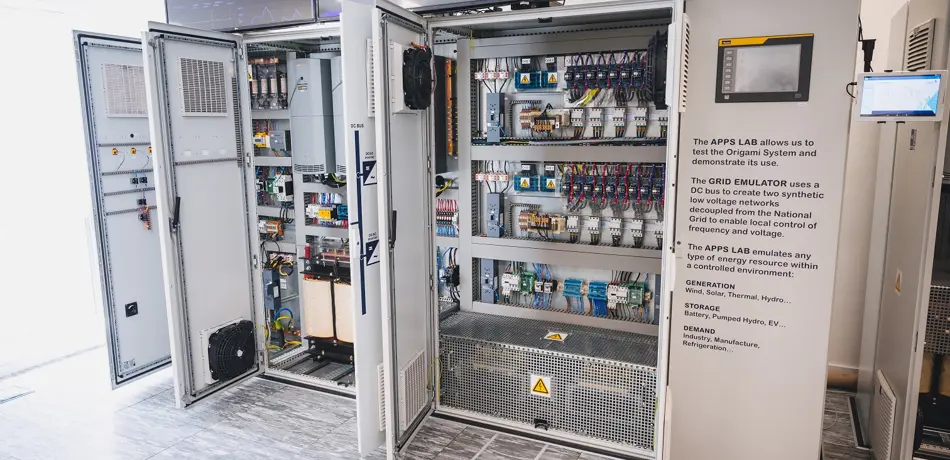The Apps Lab is a highly sophisticated environment which allows for real-world simulations of the UK’s electricity network. The Oxford University/Origami collaboration will enable comprehensive real-world testing, raise awareness of pioneering green energy technologies and foster cutting-edge research and educational advancement.
As part of a strategic partnership with The ZERO Institute (Zero-carbon Energy Research Oxford), Independent BESS Portfolio Management platform Origami has announced that its state-of-the-art Applications Laboratory (Apps Lab) has been relocated to The University of Oxford. The ZERO Institute brings together researchers from across the University of Oxford to tackle questions surrounding zero-carbon energy systems, and to accelerate multi-disciplinary research on the zero-carbon transition.
The Apps Lab will foster cutting-edge research and educational advancement, it will enable comprehensive real-world testing and raise awareness of pioneering green energy technologies. This strategic collaboration offers students, researchers and private sector businesses an unprecedented opportunity to engage with real industrial-scale energy assets, strengthening the link between academic research and practical industry solutions.
A Unique Resource for Testing & Simulation
The Apps Lab is a highly sophisticated environment which allows for real-world simulations of the UK’s electricity network. The equipment in the Lab enables physical experiments using real energy flows in addition to running purely simulation-based models. Central to this capability is a custom-built grid simulator. This system enables precise control over power flows, facilitating the creation of various scenarios to test and refine energy applications. Connected to the grid simulator are five core assets representing generation, demand and storage, all of which are managed via Origami’s gateway devices and which interface with Origami’s cloud-hosted software platform.
By leveraging this cutting-edge technology, the Lab allows users to simulate and test real-world grid dynamics both in-person and online, including frequency fluctuations which occur as demand and generation levels shift in real-time. The Lab enables rapid testing without having to wait for specific grid events which significantly shortens the software development cycle. As electricity grids are increasingly powered by renewables, with energy storage used to balance intermittent supply, powerful software applications (fed by large streams of data), will be required to facilitate ‘smart’ grid management.
The Apps Lab will continue to operate as a customer-facing exhibition space, where some of the energy industry’s most influential actors can experience this groundbreaking facility firsthand. The Apps Lab offers a unique opportunity to witness exactly how dynamic energy systems interact, providing visitors with deeper insights into the complexities of modern energy management.
Driving Innovation with Real Industrial Assets
What sets the Apps Lab apart from other simulation tools is the use of real, industrial-grade energy infrastructure. The Lab’s distribution panels mirror those found in electricity grid substations across the UK. The Lab also features a grid-scale Battery Energy Storage System (BESS) which has been customized for flexible testing. The Lab’s battery asset simulates various storage types and enables real-time data streaming and analysis at various levels of the battery system. Such capabilities enable Origami to design and demonstrate solutions tailored to real-world scenarios for how BESS asset investors and owner/operators can best manage and monetise these types of battery systems.
Pioneering Collaboration with Academia
In collaboration with Oxford University’s ZERO Institute, Origami’s Apps Lab offers a unique educational and research platform for the next generation of energy innovators. Students and researchers will gain hands-on experience with industrial assets, while contributing academic insights to the development of new technologies. The Lab’s controlled environment offers an ideal setting for research, with the potential to explore new avenues in energy management, frequency control, and energy storage systems. This collaboration is set to deliver meaningful contributions to the future of the energy sector.
“Understanding the future zero-carbon energy system is at the heart of our work and The Apps Lab will enable cutting edge research, and research led teaching to explore dynamic control strategies to accelerate the adoption of zero-carbon grids.”
Professor Paul Shearing, Director of The ZERO Institute
How will Oxford University exploit this new opportunity?
The ZERO Institute is a centre for world-leading research, thought leadership and education on the zero carbon energy transition. Building on existing research, ZERO is addressing interactions and systems issues across disciplines with a focus on accelerating research to real world impact. The Apps Lab will enable researchers across Oxford to engage with cutting edge hardware and software to simulate renewable grids, and to develop control strategies, battery management systems and data security approaches.
The optimisation and control group (Dr Jack Umenberger, Senior Research Fellow, ZERO Institute) will investigate optimal charge/discharge decisions for battery storage in energy markets. This facility will allow us to incorporate factors related to the physics of the device, including temperature profiles, state of charge uncertainty, and battery health/degradation considerations.
The energy and environmental informatics group (Professor David Wallom, Professor of Informatics, Oxford e-Research Centre) will investigate the use of this facility to build more secure future energy systems, including further insights into the cyber security of storage-as-a-service facilities.

IBME Bellhouse BioEngenuity Event
Event

